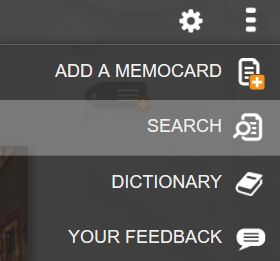You can study any subject with SuperMemo
(David Brown, USA, Dec 11, 2000)
Question:
Do you have any first hand accounts of law school students using this method?
Answer:
Yes. SuperMemo should make a difference to every student. The challenge posed by the law is that a portion of the material to study is changing as quickly as the laws of the land. Consequently, outdated knowledge may do more harm than no knowledge at all. You are welcome to discuss this problem with an avid student of law and an addicted user of SuperMemo: Mariusz Zmuda
SuperMemo is not difficult!
(Crizeldo G. Cariaso, MD, Philippines, Dec 17, 1997)
Question:
Your software looks very time consuming … is the learning curve very steep?
Answer:
Your opinion is not unusual. However, SuperMemo is much simpler than it looks. Try this:
- choose Add new (Alt+A) and type in question and answer in the editing fields
- choose Learn (Ctrl+L) to learn the collected material
You do not really need much more to make good use of SuperMemo!!! After some time you will yet need to know how to make a back up copy (e.g. with File : Tools : Quick backup). See: ABC of SuperMemo
You can learn your own material
Question:
Can I learn my own material with SuperMemo or do I have to buy it from Super Memory Store?
Answer:
You can learn your own material. It is very easy to add your own questions and answers with Alt+A. You can also build more complex elements, e.g. with pictures or with sound
SuperMemo determines the repetitions, but you determine the speed of learning new material
(Eli Liang, Oct 02, 2001)
Question:
In a new collection I created, there are 4000 pending items. Do I decide myself how many of the 4000 pending items to memorize?
Answer:
Yes. It is your memory performance that determines the optimum dates of repetitions. SuperMemo tries to schedule repetitions on those dates. However, it is up to you to decide how much new material you want to memorize daily. Your decision will primarily be based on how much time you can devote to learning and how important the learning material is
Importing materials from the Internet
(CMaggio99, Mon, Apr 22, 2002 8:21)
Question:
I would like to be able to browse the Internet within SuperMemo and be able to highlight a piece of text and hit a button called Question and one Answer. It would be great to be able to do this with pictures as well
Answer:
SuperMemo 2002 or later provides these functions in a way that should be no less efficient:
- You do your browsing in your favorite web browser. If you do it in Internet Explorer, the import process can be automated
- You do not select questions and answers separately. It is by far more efficient to first select a fragment and then build questions and answers with cloze deletions. A single paragraph may produce several questions. Cloze deletions make it possible to generate N items with N+1 selections (one for the paragraph and N for individual clozes). Selecting questions and answers separately would require N*2 selections
- You can extract fragments and clozes with keyboard shortcuts (Alt+X and Alt+Z), but you can also use Read toolbar buttons. To bring the toolbar up use Window : Toolbars : Read and save the layout with Window : Layout : Save as default (Ctrl+Shift+F5)
Go to www.super-memo.com to see current prices
(ZSEG, Fri, Nov 30, 2001 11:45)
Question:
What is the current price of SuperMemo?
Answer:
Current prices of various versions of SuperMemo are listed here:
Increased self-confidence is a frequent side effect of using SuperMemo
(Francoise, Wed Nov 21, 2001 10:46 pm)
Question:
I am keen to improve my vocabulary and have been battling illness. Trying to learn Share Trading without much success. My concentration or memory are NOT working at all it seems. But with SuperMemo I’m sure I will be able to remember all those abbreviations and their meanings
Answer:
Indeed, SuperMemo is ideally suited for learning vocabulary. However, your problem may be the high similarity of individual items that results in interference. In other words, you confuse items among each other. If not applied patiently and methodically, SuperMemo may even add to frustration as it will extract those hardest pieces and torture you with these ad nauseam. You will need to improve your mnemonic techniques and exercise patience. As for memory and concentration complaints, a large portion of population believe they are in the same trouble. This rarely has a true underlying cause beyond lack of basic mnemonic and concentration skills. If your vocabulary scores improve, your confidence will increase and perhaps help your remove those self-imposed limitations. This is a frequent and a highly welcome side effect of learning with SuperMemo
Planning to learn vocabulary
(Wietze Baron, Netherlands, Wed, Jun 12, 2002 1:04)
Question:
Given the need to know X lexical items and given that the items are ordered in terms of frequency of use, would SuperMemo allow me to produce a timeline (say weeks/days) and a list of items that would have to be introduced or rehearsed at each particular time segment?
Answer:
In SuperMemo, you start with a queue of items to learn. You introduce as many items to the learning process daily as you deem necessary or convenient (see: Introduction to SuperMemo). You can work 3 minutes or you can work 120 minutes. SuperMemo will begin introducing new elements only when you pass all outstanding repetitions (see: Learning with SuperMemo). This behavior can be overridden but it is not recommended. SuperMemo does not create a timeline. The list of items to be introduced to the learning process is called the pending queue and can be edited by the user. There are no time segments in SuperMemo. Once you edit the queue of elements, you will focus on learning within the available time. Other parameters are optional. You can, for example, monitor the number of items in the process (e.g. Memorized), and/or the number of items outstanding for repetition on a given day (Outstanding). See: Statistics in SuperMemo.
For learning vocabulary, we believe SuperMemo is the most efficient method in existence
The trial version of SuperMemo is only limited by the time of use
(Www1wiz, Thursday, October 03, 2002 6:12 PM)
Question:
Is the trial version of SuperMemo fully functional?
Answer:
Yes, it is. The only limitation is the credit of 100 points, which is displayed in the parentheses on the red registration bar. The amount of credit left depends on how heavily you use the program. Once this credit is used up, you will be asked to input the unlock password. See: Download
With HTML SuperMemo covers most text-related learning applications
(CECIL CLEMENTS, Saturday, January 11, 2003 10:35 PM)
Question:
Will I be able to put IRS publications into SuperMemo for my learning activities?
Answer:
It depends on their format and layout. As SuperMemo supports HTML, you can learn English texts from nearly any source. All you need is some copy and paste. Some exotic formats or complex layouts may cause more difficulty. With some effort and learning a couple of technicalities, you can assume that you can learn anything that is viewable in Internet Explorer 6.0 or later
With supervision, SuperMemo can be used to teach kids of any age
(Tami L Barrett, Jun 05, 2004, 14:17:30)
Question:
I’m looking for software to teach my 8-10 year old children the locations of all the countries of the world (a little at a time). There are some drills in SuperMemo, but none that teach. Is your program appropriate for a child of that age?
Answer:
With the appropriate learning material, SuperMemo can be made appropriate for any age. However, the lower the age the more supervision or inventiveness is needed on the part of the parent or teacher. Some users even train babies long before they can approach the computer. A dry drill “Countries of the World” collection will produce great recall in an 8 year old, but the wording of question might need to be simplified. In addition, most of kids of that age are not willing to proceed with repetitions on their own. In other words, doing it together, at least in the beginning would be necessary. SuperMemo can “teach” if you have or create the appropriate presentation material. However, it is often far simpler to explain the material in a traditional way and structure only the review material in SuperMemo. After all, the active recall material (e.g. questions and answers) is all that is needed in the long run
You can put your learning material into different categories
(nick wei, Saturday, November 09, 2002 5:44 AM)
Question:
I am a user of SuperMemo for Palm Pilot. In this version, the learning material of a given database can be put into different categories. Is it also possible in SuperMemo for Windows?
Answer:
Yes, it is. For thorough discussion of categories in SuperMemo for Windows, read: Using categories
Why isn’t everybody using SuperMemo?
(KK, USA, Mar 20, 2002)
Question:
“Would you buy/use a program that accelerates your learning N times?“. The answer is, of course, “yes“. Then why is not everybody using SuperMemo?
Answer:
“Would you buy/use a program that guarantees an ideal weight and cholesterol level?“. The answer is, of course, “yes“. Then why is not everybody exercising (enough) and eating healthy?
In both cases of SuperMemo and exercise, the answer is the same: humans crave instant gratification. Call it evolutionary mal-adaptation to the present-day lifestyle and challenges. Only long-distance runners (in learning, exercise or in life in general) take a wider perspective. Those are the future winners. SuperMemo is strongest among those who can find instant gratification in being knowledgeable. This gratification is psychogenic. Few are born with it. Most learn it through years of positive conditioning
The capacity of SuperMemo for the learning material is practically unlimited
(CECIL CLEMENTS, Wednesday, February 12, 2003 6:36 PM)
Question:
Can you give me any idea how many questions and answers I can type into SuperMemo?
Answer:
The number is practically limited only by the speed of your computer and the size of your memory. Theoretical limitation is 2 billion items. You may observe a decrease in performance beyond a million elements or beyond 1 GB of data; however, few users ever arrive at those limits even with a very intense learning process.
Which SuperMemo for memorizing a book?
(nader c., Saturday, August 03, 2002 12:37 PM)
Question:
I want to know which SuperMemo to buy. I want to remember and study a book about 300 pages long. The book is written as an MS Word document
Answer:
The best technique to master a book in an electronic format is incremental reading. The newest SuperMemo for Windows will do the job best. See: Which SuperMemo to choose?
Is SuperMemo needed at all?
(Jason Roos, USA, Mar 27, 2001)
Question:
When I need to memorize a bunch of information, I make flashcards. My gut is usually a good indicator of when I need to go through them again. It’s surprising to me there seems to be so much scientific study behind SuperMemo. (full text below)
Answer:
If you try SuperMemo for some time, you will notice that it is quite liberating to let the computer do the guessing for you. If you later go into thousands of memorized elements, your gut will fail you at some point. After all, it is not easy to guess which of your 100,000 items is closest to being forgotten.
Full text:
Jason Roos: When I need to memorize a bunch information, I make flashcards:
- I write a question on one side and an answer on the other
- I gather all the cards up, and go through them one at a time
- Those cards I get wrong, I set aside in a “don’t know yet” pile. Those I get right, I set aside in a “know it” pile
- After I’ve passed through the stack once, I pick up the “don’t know yet” pile and repeat this sorting process until they’ve all been memorized
My gut is usually a good indicator of when I need to go through them again. If I feel confident, I know I’m ready to take the test. Intervals are not that accurately determinable, and 4 days for the first one, in my experience, is waaaay too long [in SuperMemo, the first interval will depend on the user and the learning material]. I need to pass through them every 30 minutes to an hour for at least a day, before they’re reasonably secure in my head. Of course, it all depends on the type of material and how many days I slept in class.
This method [SuperMemo] is hardly unique– that’s how many people study. And the effect is identical to your unnecessarily complex and rather tedious, I think, worksheets and software. It’s surprising to me there seems to be so much scientific study behind it. I find it fairly simple and obvious



